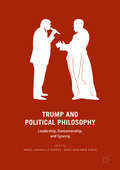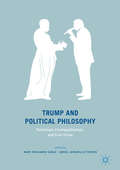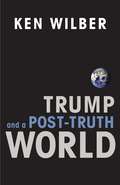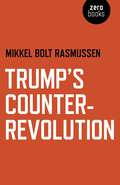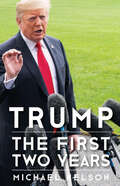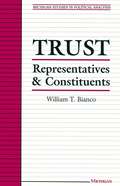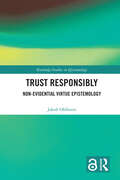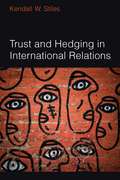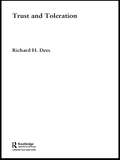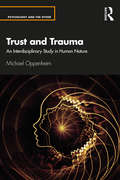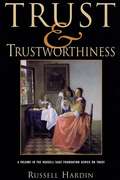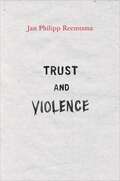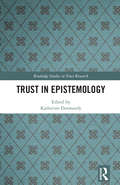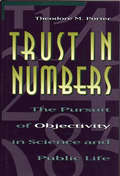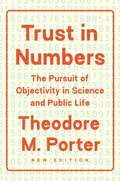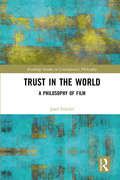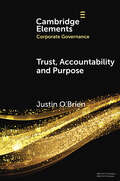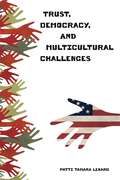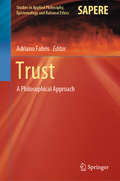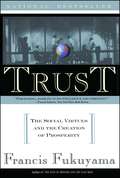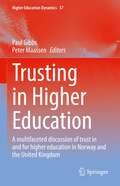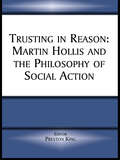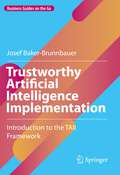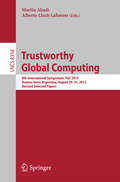- Table View
- List View
Trump and Political Philosophy: Leadership, Statesmanship, and Tyranny
by Marc Benjamin Sable Angel Jaramillo TorresThis book aims to recover from ancient and modern thinkers valuable arguments about statesmanship, leadership, and tyranny which illuminate reassessments of political science and practice after the election of Donald Trump. Like almost everyone else, contemporary political scientists were blind-sided by the rise of Trump. No one expected a candidate to win who repeatedly violated both political norms and the conventional wisdom about campaign best practices. Yet many of the puzzles that Trump’s rise presents have been examined by the great political philosophers of the past. For example, it would come as no surprise to Plato that by its very emphasis on popularity, democracy creates the potential for tyranny via demagoguery. And, perhaps no problem is more alien to empirical political science than asking if statesmanship entails virtue or if so, in what that virtue consists: This is a theme treated by Plato, Aristotle, and Machiavelli, among others. Covering a range of thinkers such as Confucius, Plutarch, Kant, Tocqueville, and Deleuze, the essays in this book then seek to place the rise of Trump and the nature of his political authority within a broader institutional context than is possible for mainstream political science.
Trump and Political Philosophy: Patriotism, Cosmopolitanism, And Civic Virtue
by Marc Benjamin Sable Angel Jaramillo TorresThis book seeks to address the relation of political philosophy and Donald Trump as a political phenomenon through the notions of patriotism, cosmopolitanism, and civic virtue. Political philosophers have been prescient in explaining trends that may explain our political misgivings. Madison warned during the debates on the Constitution that democracies are vulnerable to factions based on passion for personalities and beliefs; various continental thinkers have addressed the problem of nihilism—the modern loss of faith in objective standards of truth and morality—that in Max Weber’s analysis pointed to the importance of charisma, in Carl Schmitt’s to the idea that politics is essentially rooted in the definition of friends and enemies, and in early Heidegger resulted in the emphasis on the enduring significance of local, rather than cosmopolitan values. The former concerns—regarding demagoguery, charisma and nihilism—will enable an evaluation of Trump as a political character, while the latter concerns—regarding the status of universal versus local values—will enable us to evaluate the content of “Trumpism.” Taken together, these essays seek to advance the public conversation about the relationship between the rise of Trump and the ideological forces that seek to justify that rise.
Trump and a Post-Truth World: An Evolutionary Self-correction
by Ken WilberA provocative and balanced examination of our current social and political situation -- by a cutting-edge philosopher of our times.The world is in turmoil. As populist waves roil the Brexit-bound U.K., along with Europe, Turkey, Russia, Asia—and most visibly, the U.S. with the election of Donald Trump—nationalist and extremist political forces threaten the progress made over many decades. Democracies are reeling in the face of nihilism and narcissism. How did we get here? And how, with so much antagonism, cynicism, and discord, can we mend the ruptures in our societies? In this provocative work, philosopher Ken Wilber applies his Integral approach to explain how we arrived where we are and why there is cause for hope. He lays much of the blame on a failure at the progressive, leading edge of society. This leading edge is characterized by the desire to be as just and inclusive as possible, and to it we owe the thrust toward women’s rights, the civil rights movement, the environmental movement, and the concern for oppression in all its forms. This is all evolutionarily healthy; what is unhealthy is a creeping postmodernism that is elitist, “politically correct,” insistent on an egalitarianism that is itself paradoxically hierarchical, and that looks down on “deplorables.” Combine this with the techno-economic demise of many traditional ways of making a living, and you get an explosive mixture. As Wilber says, for some Trump voters: “Everywhere you are told that you are fully equal and deserve immediate and complete empowerment, yet everywhere are denied the means to actually achieve it. You suffocate, you suffer, and you get very, very mad.” It is only when members of society’s leading edge can heal themselves that a new, Integral evolutionary force can emerge to move us beyond the social and political turmoil of our current time to offer genuine leadership toward greater wholeness.
Trump's Counter-Revolution
by Mikkel Bolt RasmussenIn Trump's Counter-Revolution, Mikkel Bolt Rasmussen looks behind the craziness of Donald Trump to decipher the formation of a new kind of fascism, late-capitalist fascism, that is intent on preventing any kind of real social change. Trump projects an image of America as threatened, but capable of re-creating itself as a united, white and patriarchal community: "Make America great again". After forty years of extreme, uneven development in the US, Trump's late-capitalist fascism fuses popular culture and ultra-nationalism in an attempt to renew the old alliance between the white working class and the capitalist class, preventing the coming into being of an anti-capitalist alliance between Occupy and Black Lives Matter. 'A lucid, clear-eyed analysis of the morbid spectacle of Trump's racist counterrevolution. Mikkel Bolt proposes to add to the rubble of the neoliberal order by demolishing the political form of capitalism - democracy itself - as it slides into fascism. Welcome to life in the postcolony.' Iain Boal, co-author of Afflicted Powers: Capital and Spectacle in a New Age of War
Trump's First Year (Miller Center Studies on the Presidency)
by Michael NelsonDonald Trump took office in January 2017 under mostly favorable conditions. He inherited neither a war nor an economic depression, and his party controlled both houses of Congress. He leveraged this successfully in some ways by delivering on his campaign promises to roll back regulations on business, and he saw his nominee for the Supreme Court, Neil Gorsuch, approved swiftly and with little controversy. Many more actions, however, have been perceived as failures or even threats to a safe, functional democracy, from immigration policies defied by state and local governments and volatile dealings with North Korea to unsuccessful attempts to pass major legislation and the inability to fill government positions or maintain consistent White House staff. In Trump’s First Year, Michael Nelson, one of our finest and most objective presidential scholars, provides a thorough account and scholarly assessment of Donald Trump’s first year as president, starting with his election and transition in 2016. The analysis is grounded in the modern history of the presidency as well as in the larger constitutional and political order. Nelson considers the dramatic election itself, the forming and reforming of the administration, congressional relations, executive actions, bureaucratic politics, judicial appointments and decisions, media relations and public communications, and public opinion. Published on the first anniversary of Trump’s inauguration, Nelson’s book offers the most complete and up-to-date assessment of this still-unfolding story. Miller Center Studies on the Presidency
Trump: The First Two Years (Miller Center Studies on the Presidency)
by Michael NelsonOn the first anniversary of Donald Trump’s presidency, Michael Nelson, one of our finest and most objective presidential scholars, published Trump’s First Year, a nonpartisan assessment that was widely hailed as the best account of one of the most unusual years in presidential history. At the midpoint of Trump’s term, Nelson has updated his book to include the second year, which if anything has proven to be even more remarkable.Beginning with an examination of the dramatic 2016 election, Nelson’s book follows Trump as he takes office under mostly favorable conditions, with relative stability at home and abroad and his party in control of both houses of Congress. Trump leveraged this successfully in some ways, from the confirmation of his nominee Neil Gorsuch to the Supreme Court to the passage of his tax-reform bill. But many more actions were perceived as failures or even threats to a safe, functional democracy, including immigration policies defied by state and local governments, volatile dealings with North Korea, unsuccessful attempts to pass major legislation, and the inability to fill government positions or maintain consistent White House staff.As Nelson demonstrates in a substantial addition to the original book, Trump’s effectiveness, or lack thereof, did not change significantly in his second year in office, but his approach often did. With the Mueller investigation and the midterm elections looming, Trump threw off his advisors’ restraints and acted more directly on his impulses, reverting to the instincts and rhetoric that had won him the election. While opposition to Trump remained strong in many quarters, resistance among GOP leaders crumbled as they were confronted with their constituents’ support of the president.Published on the second anniversary of Trump’s inauguration, Nelson’s book offers the most complete and up-to-date assessment of this still-unfolding story.Praise for the first edition:"Measured, scholarly, and always accessible, this is a cogent analysis of the first year of the Trump presidency."--the Independent" Trump’s First Year won't generate the bombshell headlines of more sensationalist and gossipy books, but it provides context and balance for its conclusions, ones that are consistently at odds with Trump's own assessment of his performance."--Kirkus Reviews"Providing one of the earliest objective evaluations of President Donald J. Trump’s administration, Nelson demonstrates why he remains a leading figure in the field of presidency studies."--Choice
Trust Responsibly: Non-Evidential Virtue Epistemology (Routledge Studies in Epistemology)
by Jakob OhlhorstThis book offers a defence of Wrightean epistemic entitlement, one of the most prominent approaches to hinge epistemology. It also systematically explores the connections between virtue epistemology and hinge epistemology. According to hinge epistemology, any human belief set is built within and upon a framework of pre-evidential propositions – hinges – that cannot be justified. Epistemic entitlement argues that we are entitled to trust our hinges. But there remains a problem. Entitlement is inherently unconstrained and arbitrary: We can be entitled to any hinge proposition under the right circumstances. In this book, the author argues that we need a non-arbitrariness clause that protects entitlement from defeat. This clause, he argues, is to require epistemic virtue. Virtuous cognitive dispositions provide the non-arbitrariness clause that protects entitlement from defeat. The epistemic character of the agent who holds a particular set of hinges tells us something about the hinges’ epistemic status. Conversely, epistemic virtues are cognitive dispositions and capacities that rely on hinge propositions – without trusting in some hinges, we would be unable to exercise our virtues. Trust Responsibly will appeal to scholars and advanced students working on epistemology, Wittgenstein, and virtues.
Trust and Hedging in International Relations
by Kendall StilesDo states trust each other? What are the political and ethical implications of trust? Drawing from a wide range of disciplines, Trust and Hedging in International Relations adds to the emerging literature on trust in international relations by offering a systematic measure of state-to-state trust. Looking at how relationships between European microstates and their partners have evolved over the past few centuries, Stiles finds that rather than trusting, most microstates are careful to hedge in their relations by agreeing only to arrangements that provide them with opt-out clauses, heavy involvement in joint decision-making, and sunset provisions. In the process, Stiles assesses the role of rationality, social relations, identity politics, and other theories of trust to demonstrate that trust is neither essential for cooperation nor a guarantee of protection and safety. Finally, he explores the ethical implications of a foreign policy founded on trust—in particular whether heads of state have the right to enter into open-ended agreements that put their citizens at risk.
Trust and Toleration (Routledge Studies in Twentieth-Century Philosophy)
by Richard H. DeesToleration would seem to be the most rational response to deep conflicts. However, by examining the conditions under which trust can develop between warring parties, it becomes clear that a fundamental shift in values - a conversion - is required before toleration makes sense. This book argues that maintaining trust is the key to stable practices of toleration.
Trust and Trauma: An Interdisciplinary Study in Human Nature (Psychology and the Other)
by Michael OppenheimThis interdisciplinary text brings together perspectives from leading psychoanalysts and modern Jewish philosophers to offer a unique investigation into the dynamic between the fundamental trust in the self, other persons, and the world, and the devastating force of emotional trauma. Chapters examine the challenges of witnessing and acknowledging suffering; trust in God; and the traumatic effects of the Holocaust. The result is a deeper understanding of the fundamental relationality of humans, the imperative of responsibility for the Other, the fragility of meaning, and the metaphorical powers of religious language. Authors representing two standpoints, the psychological/ psychoanalytic and the religious/ philosophical, provide key insights. Erik Erikson, Jessica Benjamin, Judith Herman, and Bessel van der Kolk support the psychological discourse, while Franz Rosenzweig, Martin Buber, and Abraham Joshua Heschel present the Jewish philosophical discourse. This book is written for professionals and advanced students in psychoanalysis, philosophy, and Jewish and religious studies. Its accessible and engaging style will also appeal to general readers with an interest in philosophical, psychological, and religious perspectives on some of the most elemental human concerns.
Trust and Trustworthiness
by Russell HardinWhat does it mean to "trust?" What makes us feel secure enough to place our confidence—even at times our welfare—in the hands of other people? Is it possible to "trust" an institution? What exactly do people mean when they claim to "distrust" their governments? As difficult as it may be to define, trust is essential to the formation and maintenance of a civil society. In Trust and Trustworthiness political scientist Russell Hardin addresses the standard theories of trust and articulates his own new and compelling idea: that much of what we call trust can be best described as "encapsulated interest." Research into the roles of trust in our society has offered a broad range of often conflicting theories. Some theorists maintain that trust is a social virtue that cannot be reduced to strategic self-interest; others claim that trusting another person is ultimately a rational calculation based on information about that person and his or her incentives and motivations. Hardin argues that we place our trust in persons whom we believe to have strong reasons to act in our best interests. He claims that we are correct when we assume that the main incentive of those whom we trust is to maintain a relationship with us—whether it be for reasons of economic benefit or for love and friendship. Hardin articulates his theory using examples from a broad array of personal and social relationships, paying particular attention to explanations of the development of trusting relationships. He also examines trustworthiness and seeks to understand why people may behave in ways that violate their own self-interest in order to honor commitments they have made to others. The book also draws important distinctions between vernacular uses of "trust" and "trustworthiness," contrasting, for example, the type of trust (or distrust) we place in individuals with the trust we place in institutions Trust and Trustworthiness represents the culmination of important new research into the roles of trust in our society; it offers a challenging new voice in the current discourse about the origins of cooperative behavior and its consequences for social and civic life. A Volume in the Russell Sage Foundation Series on Trust
Trust and Violence: An Essay on a Modern Relationship
by Jan Philipp ReemtsmaA philosophical investigation into the connections between trust and violenceThe limiting of violence through state powers is one of the central projects of the modern age. Why then have recent centuries been so bloody? In Trust and Violence, acclaimed German intellectual and public figure Jan Philipp Reemtsma demonstrates that the aim of decreasing and deterring violence has gone hand in hand with the misleading idea that violence is abnormal and beyond comprehension. We would be far better off, Reemtsma argues, if we acknowledged the disturbing fact that violence is normal. At the same time, Reemtsma contends that violence cannot be fully understood without delving into the concept of trust. Not in violence, but in trust, rests the foundation of true power.Reemtsma makes his case with a wide-ranging history of ideas about violence, from ancient philosophy through Shakespeare and Schiller to Michel Foucault, and by considering specific cases of extreme violence from medieval torture to the Holocaust and beyond. In the midst of this gloomy account of human tendencies, Reemtsma shrewdly observes that even dictators have to sleep at night and cannot rely on violence alone to ensure their safety. These authoritarian leaders must trust others while, by means other than violence, they must convince others to trust them. The history of violence is therefore a history of the peculiar relationship between violence and trust, and a recognition of trust's crucial place in humanity.A broad and insightful book that touches on philosophy, sociology, and political theory, Trust and Violence sheds new, and at times disquieting, light on two integral aspects of our society.
Trust in Epistemology (Routledge Studies in Trust Research)
by Katherine DormandyTrust is fundamental to epistemology. It features as theoretical bedrock in a broad cross-section of areas including social epistemology, the epistemology of self-trust, feminist epistemology, and the philosophy of science. Yet epistemology has seen little systematic conversation with the rich literature on trust itself. This volume aims to promote and shape this conversation. It encourages epistemologists of all stripes to dig deeper into the fundamental epistemic roles played by trust, and it encourages philosophers of trust to explore the epistemological upshots and applications of their theories. The contributors explore such issues as the risks and necessity of trusting others for information, the value of doing so as opposed to relying on oneself, the mechanisms underlying trust’s strange ability to deliver knowledge, whether depending on others for information is compatible with epistemic responsibility, whether self-trust is an intellectual virtue, and the intimate relationship between epistemic trust and social power. This volume, in Routledge’s new series on trust research, will be a vital resource to academics and students not just of epistemology and trust, but also of moral psychology, political philosophy, the philosophy of science, and feminist philosophy – and to anyone else wanting to understand our vital yet vulnerable-making capacity to trust others and ourselves for information in a complex world.
Trust in Numbers: The Pursuit of Objectivity in Science and Public Life
by Theodore M. PorterThis investigation of the overwhelming appeal of quantification in the modern world discusses the development of cultural meanings of objectivity over two centuries. How are we to account for the current prestige and power of quantitative methods? The usual answer is that quantification is seen as desirable in social and economic investigation as a result of its successes in the study of nature. Theodore Porter is not content with this. Why should the kind of success achieved in the study of stars, molecules, or cells be an attractive model for research on human societies? he asks. And, indeed, how should we understand the pervasiveness of quantification in the sciences of nature? In his view, we should look in the reverse direction: comprehending the attractions of quantification in business, government, and social research will teach us something new about its role in psychology, physics, and medicine. Drawing on a wide range of examples from the laboratory and from the worlds of accounting, insurance, cost-benefit analysis, and civil engineering, Porter shows that it is "exactly wrong" to interpret the drive for quantitative rigor as inherent somehow in the activity of science except where political and social pressures force compromise. Instead, quantification grows from attempts to develop a strategy of impersonality in response to pressures from outside. Objectivity derives its impetus from cultural contexts, quantification becoming most important where elites are weak, where private negotiation is suspect, and where trust is in short supply.
Trust in Numbers: The Pursuit of Objectivity in Science and Public Life
by Theodore M. PorterA foundational work on historical and social studies of quantificationWhat accounts for the prestige of quantitative methods? The usual answer is that quantification is desirable in social investigation as a result of its successes in science. Trust in Numbers questions whether such success in the study of stars, molecules, or cells should be an attractive model for research on human societies, and examines why the natural sciences are highly quantitative in the first place. Theodore Porter argues that a better understanding of the attractions of quantification in business, government, and social research brings a fresh perspective to its role in psychology, physics, and medicine. Quantitative rigor is not inherent in science but arises from political and social pressures, and objectivity derives its impetus from cultural contexts. In a new preface, the author sheds light on the current infatuation with quantitative methods, particularly at the intersection of science and bureaucracy.
Trust in the World: A Philosophy of Film (Routledge Studies in Contemporary Philosophy)
by Josef FrüchtlThis book examines the theory, originally raised in Gilles Deleuze’s philosophy of film, that cinema has the power to restore our trust in the world. Früchtl demonstrates that cinema does this in three main ways: by restoring our belief in the absurd, in the body and in a sceptical abstention from judging and acting. Cinema shares this ability with other arts, but what sets it apart in particular is that it evokes Modernity and its principle of subjectivity. This book further develops the idea of trust and cinema by synthesizing the philosophies of complementary thinkers such as Kant, Nancy, Agamben, Benjamin and Rancière. It concludes with examination of Cavell’s solution to the problem of scepticism and a synthesis of Kantian aesthetic theory with Cavellian pragmatism. Originally published in German under the title Vertrauen in die Welt, this English-language translation features a new introduction that situates Früchtl’s work within contemporary analytical philosophy of film. It will be of interest to scholars working in Continental aesthetics, philosophy of film, and film theory.
Trust, Accountability and Purpose: The Regulation of Corporate Governance (Elements in Corporate Governance)
by Justin O'BrienThe collapse of trust can be found across all of our institutions but most of all in finance. This Element seeks to answer an existential question: how to rebuild trust in distrusting times? Integrity, responsibility and accountability must be embedded into corporate mission statements, values and codes of conduct. Through organisational and regulatory design across five interlocking themes - legal, regulatory, managerial, ethical and social. What is required is substantive rather than technical compliance; warranted rather than stated commitment to high ethical standards; effective deterrence strategies; enhanced accountability; and a shared commitment to risk within negotiated, binding and enforceable parameters.
Trust, Democracy, and Multicultural Challenges
by Patti Tamara LenardBanning minarets by referendum in Switzerland, publicly burning Korans in the United States, prohibiting kirpans in public spaces in Canada—these are all examples of the rising backlash against diversity that is spreading across multicultural societies. Trust has always been precarious, and never more so than as a result of increased immigration. The number of religions, races, ethnicities, and cultures living together in democratic communities and governed by shared political institutions is rising. The failure to construct public policy to cope with this diversity—to ensure that trust can withstand the pressure that diversity can pose—is a failure of democracy. The threat to trust originates in the perception that the values and norms that should underpin a public culture are no longer truly shared. Therefore, societies must focus on building trust through a revitalized public culture. In Trust, Democracy, and Multicultural Challenges, Patti Tamara Lenard plots a course for this revitalization. She argues that trust is at the center of effective democratic politics, that increasing ethnocultural diversity as a result of immigration may generate distrust, and therefore that democratic communities must work to generate the conditions under which trust between newcomers and “native” citizens can be built, so that the quality of democracy is sustained.
Trust: A Philosophical Approach (Studies in Applied Philosophy, Epistemology and Rational Ethics #54)
by Adriano FabrisThis book presents cutting-edge concepts on the question of trust. Written by leading experts, it investigates a paradoxical feature of contemporary society: while information and communication technologies, on the one hand, and scientific discourses, on the other, can promote more informed participation in public and democratic life, they have also led to a dramatic decline in our communicative and cooperative skills. The book analyzes the notion of trust from an interdisciplinary perspective by combining the normative (continental) and empirical (Anglo-American) approaches and by considering the political, epistemological, and historical transformations in the interpersonal relationships sparked by new technologies. Using trust as a model, it then investigates and clarifies the new types of participation that are made possible by scientific and technological advances.
Trust: Human Nature and the Reconstitution of Social Order
by Francis FukuyamaIn his bestselling The End of History and the Last Man, Francis Fukuyama argued that the end of the Cold War would also mean the beginning of a struggle for position in the rapidly emerging order of 21st-century capitalism. In Trust, a penetrating assessment of the emerging global economic order "after History," he explains the social principles of economic life and tells us what we need to know to win the coming struggle for world dominance. Challenging orthodoxies of both the left and right, Fukuyama examines a wide range of national cultures in order to divine the underlying principles that foster social and economic prosperity. Insisting that we cannot divorce economic life from cultural life, he contends that in an era when social capital may be as important as physical capital, only those societies with a high degree of social trust will be able to create the flexible, large-scale business organizations that are needed to compete in the new global economy. A brilliant study of the interconnectedness of economic life with cultural life, Trust is also an essential antidote to the increasing drift of American culture into extreme forms of individualism, which, if unchecked, will have dire consequences for the nation's economic health.
Trusting in Higher Education: A multifaceted discussion of trust in and for higher education in Norway and the United Kingdom (Higher Education Dynamics #57)
by Peter Maassen Paul GibbsThis multidisciplinary book brings together scholars from Norway and the UK to discuss the notion of trust within the structures and forms of higher education located in two distinctive localities. The meaning of trust is multi-variant and nuanced, but is omnipresent in the literature on higher education ranging from student engagement to policy exhortations. A key feature of this book is the effort to integrate the term ‘trust’ conceptually, functionally and phenomenological more generally as well as within the context of higher education. Practice from within Norway and the UK is used to illustrate and expose relevant similarities and varieties in trust and the (possible) lack of it within the sector. The book thus faces the complexity of trust and its distinctive manifestation through a number of analytical lenses and realities.
Trusting in Reason: Martin Hollis and the Philosophy of Social Action
by Preston KingMartin Hollis (d.1998) was arguably the most incisive, eloquent and witty philosopher of the social sciences of his time. His work is appreciated and contested here by some of the most eminent of contemporary social theorists. Hollis's philosophy of social action routinely distinguished between understanding (rational) and explanation (causal). He argued that the aptest account of human interaction was to be made in terms of the first. Thus he focused upon the human reasons, for, rather than upon the natural causes of, action.This volume, for the first time, brings together important essays on the work of Hollis, from many different perspectives. These include politics, sociology and economics in general; international relations, rational choice theory, constitutionalism and the rule of law as well as current concerns with relativism, Rousseauist contractarianism, 'dirty hands' and 'buck-passing'.
Trustworthy Artificial Intelligence Implementation: Introduction to the TAII Framework (Business Guides on the Go)
by Josef Baker-BrunnbauerRapidly developing Artificial Intelligence (AI) systems hold tremendous potential to change various domains and exert considerable influence on societies and organizations alike. More than merely a technical discipline, AI requires interaction between various professions. Based on the results of fundamental literature and empirical research, this book addresses the management’s awareness of the ethical and moral aspects of AI. It seeks to fill a literature gap and offer the management guidance on tackling Trustworthy AI Implementation (TAII) while also considering ethical dependencies within the company. The TAII Framework introduced here pursues a holistic approach to identifying systemic ethical relationships within the company ecosystem and considers corporate values, business models, and common goods aspects like the Sustainable Development Goals and the Universal Declaration of Human Rights. Further, it provides guidance on the implementation of AI ethics in organisations without requiring a deeper background in philosophy and considers the social impacts outside of the software and data engineering setting. Depending on the respective legal context or area of application, the TAII Framework can be adapted and used with a range of regulations and ethical principles. This book can serve as a case study or self-review for c-level managers and students who are interested in this field. It also offers valuable guidelines and perspectives for policymakers looking to pursue an ethical approach to AI.
Trustworthy Global Computing: 8th International Symposium, TGC 2013, Buenos Aires, Argentina, August 30-31, 2013, Revised Selected Papers (Lecture Notes in Computer Science #8358)
by Martín Abadi and Alberto Lluch LafuenteThis book constitutes the thoroughly refereed post-conference proceedings of the 8th International Symposium on Trustworthy Global Computing, TGC 2013, held in Buenos Aires, Argentina, in August 2013. The 15 revised full papers presented together with 3 invited talks were carefully reviewed and selected from 29 submissions. The papers cover a wide range of topics in the area of global computing and safe and reliable computation. They are organized in topical sections on security, π-calculus, information flow, models, specifications and proofs and quantitative analysis.
